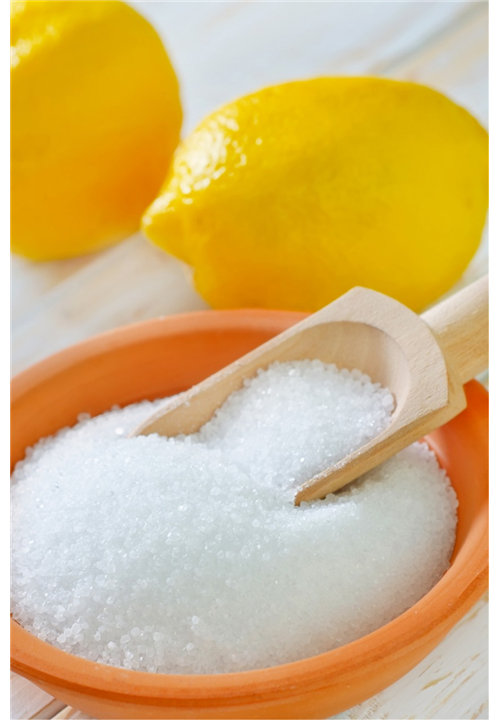Romaqo
Citric Acid (Monohydrate)
Citric Acid (Monohydrate)
Couldn't load pickup availability
Citric acid monohydrate is a natural compound derived from citrus fruits, most commonly lemons and limes. It is a crystalline white powder with a slightly acidic taste and is widely used in various industries, including food, beverage, pharmaceuticals, and cosmetics. Citric acid monohydrate is produced through fermentation or chemical synthesis and is known for its versatility, safety, and effectiveness.
Benefits:
1. Exfoliation: Citric acid is an alpha hydroxy acid (AHA) known for its exfoliating properties. When used in skincare formulations, citric acid helps to gently slough off dead skin cells, promoting cell turnover and revealing smoother, brighter skin underneath.
2. pH Adjustment: Citric acid is often used as a pH adjuster in cosmetic formulations. It can lower the pH of a product, making it more acidic, which can help to stabilize certain ingredients and improve the overall effectiveness of the formulation.
3. Antioxidant Properties: Citric acid possesses antioxidant properties, which help to neutralize free radicals and protect the skin from environmental damage. Incorporating citric acid into skincare products can help to combat signs of aging, such as fine lines, wrinkles, and hyperpigmentation.
4. Skin Brightening: Due to its exfoliating properties and ability to inhibit tyrosinase activity, citric acid can help to brighten and even out skin tone. It can reduce the appearance of dark spots, sun damage, and discoloration, leaving the skin looking more radiant and uniform.
5. Preservative Action: Citric acid exhibits mild preservative properties, which can help to extend the shelf life of cosmetic formulations by inhibiting the growth of bacteria, fungi, and mold. It is often used in conjunction with other preservatives to enhance efficacy and stability.
Uses in Cosmetics:
1. Facial Cleansers and Scrubs: Citric acid is commonly used in facial cleansers and scrubs to provide gentle exfoliation and promote a brighter, more radiant complexion. Its ability to dissolve dead skin cells helps to unclog pores, prevent acne breakouts, and improve overall skin texture.
2. Toners and Astringents: Citric acid is often found in toners and astringents due to its pH-adjusting properties. It helps to balance the skin's natural pH, tighten pores, and refine the skin's texture, leaving it feeling refreshed and revitalized.
3. Anti-Aging Serums and Creams: Citric acid is a popular ingredient in anti-aging serums and creams because of its ability to stimulate collagen production, improve skin elasticity, and reduce the appearance of fine lines and wrinkles. It also helps to protect the skin from environmental damage, delaying the signs of aging.
4. Brightening Masks and Treatments: Citric acid is frequently incorporated into brightening masks and treatments to target hyperpigmentation, sun damage, and uneven skin tone. It helps to gently exfoliate the skin, fade dark spots, and promote a more luminous complexion over time.
5. Hair Care Products: Citric acid can also be found in hair care products such as shampoos and conditioners. It helps to remove buildup from the scalp and hair, restore shine and vitality, and improve manageability. Additionally, citric acid can help to balance the pH of the scalp, preventing dandruff and promoting a healthy scalp environment.
Additional Uses in Other Cosmetics:
6. Bath Bombs: Citric acid is a key ingredient in bath bombs, contributing to their fizzing action when combined with baking soda and other dry ingredients. It reacts with the baking soda upon contact with water, releasing carbon dioxide bubbles and creating a fun and effervescent bath experience.
7. Fizzing Salts and Soaks: Citric acid is also used in fizzing bath salts and soaks, where it reacts with baking soda or bicarbonate salts to produce bubbles and release fragrance when added to bathwater. This creates a luxurious and invigorating bathing experience, leaving the skin feeling refreshed and pampered.
In summary, citric acid monohydrate is a versatile ingredient with numerous benefits for skincare, hair care, and various other cosmetic formulations. Its exfoliating, pH-adjusting, antioxidant, and preservative properties make it a valuable addition to a wide range of products, helping to improve skin texture, brighten the complexion, and promote overall skin health and vitality. Additionally, its role in creating fun and indulgent bath products adds an extra dimension of enjoyment to the cosmetic experience.
Share








